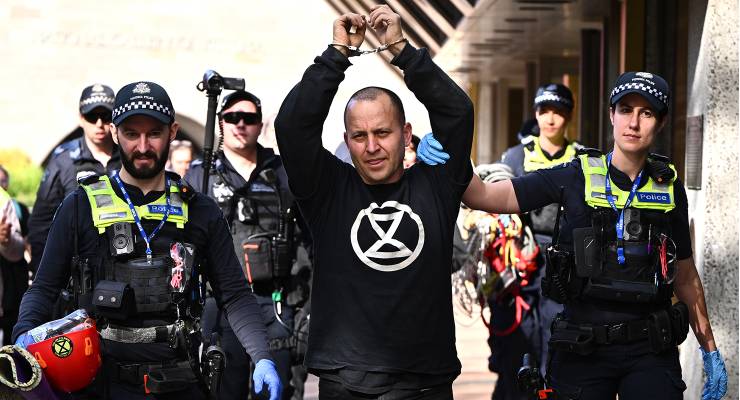
Disruptive political protest has been a key topic over recent months in Europe, the United Kingdom and in Australia.
In Germany, anti-oil protesters threw food at artworks in galleries and glued themselves to major freeways around Berlin and other cities, blocking traffic for hours and resulting in months-long prison sentences.
In the United Kingdom, two protesters have been jailed for up to three years for a 40-hour demonstration on a bridge at Dartford across the Thames, which police say caused “gridlock for miles around” and delayed almost 565,000 drivers.
Meanwhile in Australia, state governments have been progressively ramping up protest penalties. Most recently the upper house of the South Australian Parliament last week passed laws — after a marathon 14-hour debate — to significantly increase protest penalties for “anyone obstructing a public place”.
The bill was quickly introduced in response to several recent Extinction Rebellion (ER) climate protests, including one involving a woman who abseiled down a rope from a bridge, causing major delays to traffic. And in Melbourne last week, ER protesters brought peak-hour traffic to a standstill by sealing off the Kings Way exit from the West Gate Freeway.
Protesting in Oz
Most Australians likely disagree with inhibiting the right to peaceful protest. But what is the appropriate response when protesters block roads, inconvenience thousands of motorists and disrupt business?
How would Australians respond to recent moves in Europe, where German police raided protesters’ properties, shut down the website of climate change activist group Last Generation (donating to the group was considered illegal), and said they were investigating seven suspects on suspicion of forming or backing a “criminal organisation”?
Or in the Netherlands, where police moved in with water cannons and made 1500 arrests after Extinction Rebellion blocked a major road, an act the local mayor declared illegal.
There is no indication that Australian authorities will go that far, although there are already tough laws in many parts of the country.
For example, within the past year, Victoria has increased penalties for environmental protesters at logging sites and imposed heavy new penalties on animal rights activists trespassing on farms.
Similarly, New South Wales passed new laws that can see people fined up to $22,000 or imprisoned for two years if they protest on public roads, rail lines, tunnels, bridges or industrial estates. The laws were introduced as a response to a series of climate protests, during which activists blockaded the Port of Botany and some major roads.
Other states have similar obstruction laws in place, although protesters in the ACT and Northern Territory face far fewer restrictions.
A global concern
Recent developments in Germany provide insight into how one of Europe’s supposedly progressive countries is treating protesters.
In response to the blocking of roads, some left-wing German politicians have decried what they saw as a heavy-handed response to legitimate freedom of expression, though even the Green Party, the federal government’s junior coalition partner, opposed the actions of recent protesters.
Economy Minister Robert Habeck, of the Greens, said their approach was wrong: “This protest doesn’t win a majority for climate protection. Rather, it irritates people, divides society and in that sense, it’s not a helpful contribution to climate protection.”
And Interior Minister Nancy Faeser, of the Social Democrats, said the rule of law in Germany was clear: “Legitimate protest always ends where criminal offences are committed and the rights of others are violated.”
The BBC asked: “When does peaceful protest become a crime? How much disruption can a society handle? Do the rights of peaceful demonstrators outweigh the needs of ambulances, fire engines or commuters?”
Affecting change
These are legitimate questions, though it seems politicians in most Australian states are more concerned about protecting business activity than the protesters gluing themselves to artworks (while carefully avoiding any permanent damage).
When Extinction Rebellion activists glued their hands to the Perspex cover of a Picasso painting at the National Gallery of Victoria late last year, the predictable result was some short-lived media coverage and a rash of righteous tut-tutting by offended art lovers and media commentators.
But where were the local politicians? And who remembers what the protest was about?
Retired teacher Tony Gleeson — one of the protesters at the NGV — didn’t hesitate to brand it a success. “We’ve had media from all over the world in response, so yeah, I guess it on all accounts would have to be considered a success,” he told local radio. “It seems like to be successful in this work you have to disrupt people.”
Yet despite passing laws, it’s hard to assess what, if any, substantive change is achieved by shocking protests.
Even with the hindsight of history, it’s not easy to judge. When Emily Davison threw herself in front of the King’s horse at the Epsom Derby in June 1913, and later died from her injuries, did that substantially advance the cause of women’s suffrage? And when Buddhist monk Thích Quảng Đức set himself on fire in Saigon in June 1963, did that accelerate the downfall of the corrupt Diem regime in South Vietnam?
Even today, experts disagree about the historic impact of these two famous events, as they presumably disagree over the action by climate activist Wynn Bruce, who died 24 hours after setting himself on fire on the steps of the US Supreme Court in April last year.
When the Victorian state budget last week announced the end of native logging would be brought forward by six years and end in December 2023, predictably anti-logging activists hailed it as a substantial victory for their protest campaigns.
However, Treasurer Tim Pallas instead attributed the decision to severe bushfires and recent legal decisions.
“We don’t take any satisfaction in this,” he said. “The advice that we’ve got is that, legally, there will be no way through this if the courts have been used the way that they have, effectively to frustrate this industry.”
His comment suggests that some politicians at least are far from acknowledging that pesky protesters may actually have a case.
Only time will tell whether protest actions more broadly have any appreciable influence on those who make policy on the major environmental issues of the day.








Effective protest always causes disruption. Always has, always will.
The rise in protest around the world at the behaviour of governments hand in glove with the multinationals and the uber wealthy should be a clear warning to those same governments and corporations that ‘the people’ have had enough of being treated as dupes and cannon fodder and will eventually pay back in spades.
Does noone study history anymore? None of this will end well.
Too few to matter and even fewer of those who do seem to understand the lessons.
Otherwise it would not be an endless Möbius loop.
The suicides of Emily Davidson and Thich Quang Duc are seen as pivotal moments in their causes. Both were noticed, publicized and widely discussed. What measure is being used to determine their failure or success?
If protests dont disrupt and inconvenience then they are pretty much useless. They must be allowed. They are especially inconvenient for selfish people currently destroying the planet. Unfortunatly these people have a lot of money. If all you have is a hammer then every problem looks like a nail. If all you have is money then every problem looks like an easily bribed politician. That politician will then make laws to your advantage. And they are cheap too.
the French seem to know how to make protests work
They’ve had a lot of practice, three hundred years or so.
Here in Australia we could learn a lesson or two about the dangers of complacency and shrugging one’s metaphorical shoulders at the misdeeds of the ‘ruling class’. I am often dumbfounded at how little noise is made by people at the appalling behaviour of politicians and the wealthy who rip off the public at every opportunity, and pat themselves on the back for their ‘cleverness’.